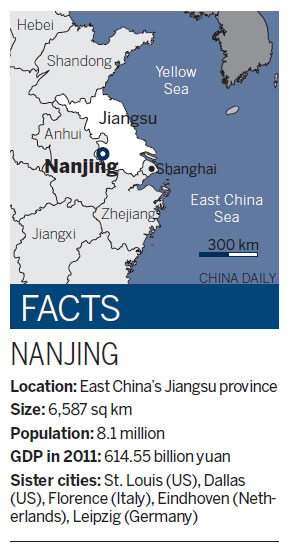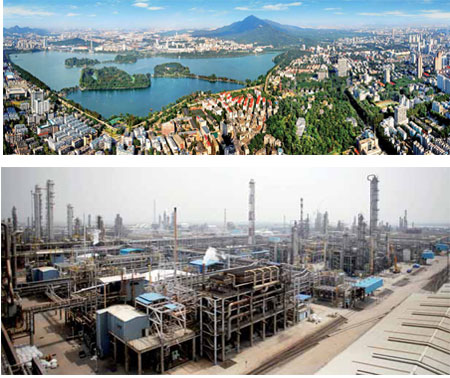Well-connected hub of activity

| Top: A bird's eye view of Nanjing, which has attracted 2,960 overseas companies with a total investment of $32.4 billion. Above: The production facility of BASF's joint venture with Yangtze Petrochemical Co in Nanjing. Photos Provided to China Daily |

The ancient capital of Nanjing builds on historic strengths to position itself as location for overseas investment
The roads are being widened, the airport is being expanded, and public services are being improved - there is a lot going on in Nanjing, "the capital of six dynasties" whose history dates back to the 5th century BC. Now, as the capital of Jiangsu province, the ancient city wants to spread its influence in modern ways. It seeks to upgrade its economy at a time when more developed regions such as Shanghai are losing labor and investors to inland areas.
"There are a lot things going on nowadays in this city, and we see more companies from Europe coming here, or who are very interested in this city," says Patricia Enzmann, general manager of the Nanjing office of the European Union Chamber of Commerce in China.
There are 11,783 projects in Nanjing with a total investment of $32.4 billion (25 billion euros) from 2,960 overseas companies, the local government said.
Located in one of the most prosperous economic hubs in China - the Yangtze River Delta, with Shanghai at its center - Nanjing is developing vigorously. Remarkable growth is taking place not only in traditional sectors such as electronics and petrochemicals, represented by Ericsson, Siemens and German chemical giant BASF, but also in high-end services and other fields.
"Regarding places for investment, no doubt Shanghai is always top of the list, but Nanjing is very competitive among the second-tier cities," says Wu Zhe, administrative director of Nanjing's investment promotion commission.
The old "southern capital" has some of the best education resources in the country, as home to more than 50 universities and colleges, and about 500 research and development centers.
It is also located close to Shanghai, where many multinational companies have headquarters, close to manufacturing cities such as Suzhou, and to undeveloped regions in Jiangsu and Anhui provinces, where there are rich labor resources, Wu says.
The operations of LG Electronics and Sharp in Nanjing make it the biggest manufacturing base for liquid crystal modules in the world. And the joint venture of BASF and Yangtze Petrochemical Company has made it the strongest player in that field.
One of Nanjing's biggest advantages, adds Wu, lies in its land supply. According to an investment environment report prepared by PwC, the cost of industrial land-use rights in Nanjing is lower than average.
As for factory construction costs, in Nanjing's Jiangning development zone it was 1,800 yuan ($285, 220 euros) per square meter in 2010, a third of the cost in Shanghai's Minhang district and 350 yuan lower than that in Hangzhou, Zhejiang province, the PwC report said.
"We are going to double the size of our current factory to 40,000 sq m. And there are still 9,000 sq m reserved for further expansion," says Christian Besnard, general manager of Valeo Transmissions China, located in the Jiangning development zone.
Valeo chose Nanjing as a manufacturing base for its clutches in 1997, largely due to its logistic advantages. It is well connected to clients in Shanghai, and in Anhui and Guangdong provinces, by expressway and railway.
Nanjing is 380 km from the East China Sea and a key link between the regions north and south of the Yangtze River, as well as a major stop on the Beijing-Shanghai high-speed rail route.
"It turned out to be a wise decision. Jiangning is a huge industrial area with a lot of space. And the governments of both Jiangning district and Nanjing city have been very efficient and helpful," Besnard says.
Local government efficiency, together with the talent produced by its universities and research institutions, a solid industrial foundation, a rich culture and a harmonious environment make this city an ideal place for investment, investors say.
"There was a big question for us in 1997 whether we should have the headquarters in Shanghai or Nanjing," says Roland Gerke, president and CEO of Bosch and Siemens Home Appliances Group, China. They found good reasons to choose Nanjing.
"Nanjing has a very good geographic location, which makes it easy to reach almost every location in China. And the local government was very helpful in welcoming us and helping us settle, and gave us clear guidance and a professional explanation of regulations," he says.
Then in 2004, when BSH Home Appliances entered a second round of investment, seeking to establish a research center, a new production base and logistics base with high added-value, they once again chose Nanjing.
"The city is close to our manufacturing bases - one in Wuxi in Jiangsu province, and one in Chuzhou, Anhui province. University graduates and research institutions here are significant to R&D," Gerke says.
For years, revenue has maintained double-digit growth. After Germany, China is the second-largest market for BSH, and is expected to catch up or even pass their home country in a couple of years, Gerke says.
"The Chinese market has huge potential, and some products, like dish washers and ovens, are not yet popular here."
Gerke says he has convinced several of his suppliers in Germany to open factories in Nanjing, which makes the supply chain more efficient.
Nanjing has also proved friendly to smaller foreign companies.

"I visited 14 places before setting up the factory in Lishui county, Nanjing," says Helmut Guesten, general manager of emz-Hanauer (Nanjing).
Emz, an electronic components maker from Germany, "is a 100-percent family business and a typical small enterprise, so we make sure every penny from our pocket goes to the right place", he says.
Unlike most other places, the county authority provides a flexible leasing contract on their factory building, and promises to reserve land for them to buy after three years, if things go well.
Some places are raising the threshold for foreign companies to locate or invest, while for Nanjing, there is still a lot of room for small- and medium-sized enterprises (SMEs), says Wu from the Nanjing government.
In fact, SMEs in Nanjing and Jiangsu province are among the most vigorous in China. Jiangsu has been included in an upcoming national pilot program to launch private placement bonds for SMEs, which will also help finance businesses.
Given its central location and effective transportation network, Nanjing's consumer market covers not only Jiangsu province, but also 10 surrounding cities in Anhui, Shandong, Henan, Zhejiang and Jiangxi provinces.
As one of the biggest cities in China, Nanjing has a large consumer market with strong purchasing power.
The retail market in the city has been flourishing. Last year, the total retail sales of consumer goods surpassed 267 billion yuan, an increase of 17.8 percent from 2010. The per capita disposable income of urban residents was 32,200 yuan last year, 13.7 percent more than in the previous year. And the city sees potential for further growth, both in market size and in consumer purchasing power.
As a leading second-tier city, Nanjing also has a clear advantage in providing the skills and talent for research and development. More than 100,000 university students graduate every year, boosting the development of new industries, including software service outsourcing, IT services, cultural and creative, communications and modern logistics.
The city has also launched a series of initiatives to support and encourage financial services, as well as the animation, comics and game industries.
These include promoting enterprise innovation, waiving or reducing government charges for foreign investors in the development zone, and offering subsidies for the developing patents and products.
"Foreign investment has been playing a key role in Nanjing's economic development, and we are looking forward to more foreign companies coming to Nanjing," Wu says.
Contact the writers through xieyu@chinadaily.com.cn
(China Daily 05/11/2012 page12)
Today's Top News
- Xi calls for promoting volunteer spirit to serve national rejuvenation
- Xi chairs CPC meeting to review report on central discipline inspection
- Reunification will only make Taiwan better
- Outline of Xi's thought on strengthening military published
- Targeted action plan to unleash consumption momentum
- Separatist plans of Lai slammed































